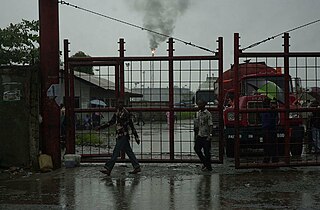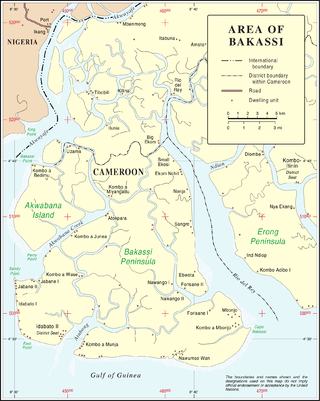Related Research Articles

From 1990 to 1995, a rebellion by various Tuareg groups took place in Niger and Mali, with the aim of achieving autonomy or forming their own nation-state. The insurgency occurred in a period following the regional famine of the 1980s and subsequent refugee crisis, and a time of generalised political repression and crisis in both nations. The conflict is one in a series of Tuareg-based insurgencies in the colonial and post-colonial history of these nations. In Niger, it is also referred to as the Second or Third Tuareg Rebellion, a reference to the pre-independence rebellions of Ag Mohammed Wau Teguidda Kaocen of the Aïr Mountains in 1914 and the rising of Firhoun of Ikazkazan in 1911, who reappeared in Mali in 1916. In fact, the nomadic Tuareg confederations have come into sporadic conflict with the sedentary communities of the region ever since they migrated from the Maghreb into the Sahel region between the 7th and 14th centuries CE. Some Tuareg wanted an independent Tuareg nation to be formed when French colonialism ended. This, combined with dissatisfaction over the new governments, led some Tuareg in Northern Mali to rebel in 1963.

The Niger Delta is the delta of the Niger River sitting directly on the Gulf of Guinea on the Atlantic Ocean in Nigeria. It is located within nine coastal southern Nigerian states, which include: all six states from the South South geopolitical zone, one state (Ondo) from South West geopolitical zone and two states from South East geopolitical zone.

Nigeria is the second largest oil and gas producer in Africa. Crude oil from the Niger Delta basin comes in two types: light, and comparatively heavy – the lighter has around 36 of API gravity while the heavier has 20–25 of API gravity. Both types are paraffinic and low in Sulphur. Nigeria's economy and budget have been largely supported from income and revenues generated from the petroleum industry since 1960. Statistics as at February 2021 shows that the Nigerian oil sector contributes to about 9% of the GDP of the nation.

The Movement for the Emancipation of the Niger Delta (MEND) is a decentralised militant group in the Niger Delta region of Nigeria. MEND's actions – including sabotage, theft, property destruction, guerrilla warfare, and kidnapping – are part of the broader conflict in the Niger Delta and reduced Nigeria's oil production by 33% between 2006-07.
Asari-Dokubo, formerly Melford Dokubo Goodhead Jr. and typically referred to simply as Asari, is a major political figure of the Ijaw ethnic group in the Niger Delta region of Nigeria. He was president of the Ijaw Youth Council for a time beginning in 2001 and later founded the Niger Delta People's Volunteer Force which would become one of the most prominent armed groups operating in the Niger Delta region. He is a Muslim with populist views and an anti-government stance that have made him a folk hero amongst certain members of the local population.

The current conflict in the Niger Delta first arose in the early 1990s over tensions between foreign oil corporations and a number of the Niger Delta's minority ethnic groups who feel they are being exploited, particularly the Ogoni and the Ijaw. Ethnic and political unrest continued throughout the 1990s despite the return to democracy and the election of the Obasanjo government in 1999. Struggle for oil wealth and environmental harm over its impacts has fueled violence between ethnic groups, causing the militarization of nearly the entire region by ethnic militia groups, Nigerian military and police forces, notably the Nigerian Mobile Police. The violence has contributed to Nigeria's ongoing energy supply crisis by discouraging foreign investment in new power generation plants in the region.
The Warri Crisis was a series of conflicts in Delta State, Nigeria between 1997 and 2003 between the Itsekiri, the Ijaw ethnic groups. Over 200,000 people were displaced by the Warri conflict between 1999 and 2006. Over 700,000 people were displaced during this period by violence in Delta State overall.

The Boko Haram insurgency began in July 2009, when the militant Islamist and jihadist rebel group Boko Haram started an armed rebellion against the government of Nigeria. The conflict is taking place within the context of long-standing issues of religious violence between Nigeria's Muslim and Christian communities, and the insurgents' ultimate aim is to establish an Islamic state in the region.
Oweizidei Thomas Ekpemupolo, also known as Tompolo, is a religious leader of the Woyin Religion, an indigenous belief system of the Ijaw people. He was a former leader of the Movement for the Emancipation of the Niger Delta (MEND), influenced by the Egbesu Deity, which represents truth, fairness, and equity - an alternate name for Woyin. Tompolo and his followers participated in the Niger Delta arm struggle for the emancipation of the region.
The Niger Delta Liberation Front (NDLF) is a militant group in Nigeria's Niger Delta. The group's former leader John Togo claims that their main goal is to secede from, and gain independence from Nigeria. The group is best known for their notorious leader John Togo who is known throughout Nigeria as a fierce soldier. Although Togo is the NDLF's most notorious member he was killed on July 19, 2011, by a Nigerian air strike near Warri in Delta State. The group is closely linked to the Movement for the Emancipation of the Niger Delta and fight side by side against the Nigerian Army. In early 2013 war erupted within the NDLF after 2 different commanders claimed to be leader. It ended after one was killed in March 2013.
Timeline of the Boko Haram insurgency is the chronology of the Boko Haram insurgency, an ongoing armed conflict between Nigerian Islamist group Boko Haram and the Nigerian government. Boko Haram have carried out many attacks against the military, police and civilians since 2009, mostly in Nigeria. The low-intensity conflict is centred on Borno State. It peaked in the mid-2010s, when Boko Haram extended their insurgency into Cameroon, Chad and Niger.

The Niger Delta Avengers (NDA) is a militant group in the Niger Delta region of Nigeria. The group publicly announced their existence in March 2016.
The 2016Niger Delta conflict is an ongoing conflict around the Niger Delta region of Nigeria in a bid for the secession of the region, which was a part of the breakaway state of Biafra. It follows on-and-off conflict in the Christian-dominated southern Niger Delta in the preceding years, as well as an insurgency in the Muslim-dominated northeast.

Jama'at Nusrat ul-Islam wa al-Muslimin is a Salafi Jihadist organisation in the Maghreb and West Africa formed by the merger of Ansar Dine, the Macina Liberation Front, al-Mourabitoun and the Saharan branch of al-Qaeda in the Islamic Maghreb. Its leaders swore allegiance to Ayman al-Zawahiri.

The Chad Basin campaign of 2018–2020 was a series of battles and offensives in the southern Chad Basin, particularly northeastern Nigeria, which took place amid the ongoing Boko Haram insurgency. The Chad Basin witnessed an upsurge of insurgent activity from early November 2018, as rebels belonging to the Islamic State's West Africa Province (ISWAP) and Boko Haram launched offensives and several raids to regain military strength and seize territory in a renewed attempt to establish an Islamic state in the region. These attacks, especially those by ISWAP, met with considerable success and resulted in the displacement of hundreds of thousands of civilians. The member states of the Multinational Joint Task Force (MJTF), namely Nigeria, Niger, Chad, and Cameroon responded to the increased insurgent activity with counter-offensives. These operations repulsed the rebels in many areas but failed to fully contain the insurgency.

The Bakassi conflict is an ongoing armed dispute over the Bakassi Peninsula of Cameroon. Originally subject to a border conflict between Cameroon and Nigeria, Bakassi later became affected by insurgencies waged by local separatists against Cameroonian government forces.

Since 2015, the border area between Burkina Faso, Mali, and Niger has been a hotbed for jihadist forces originating from Mali. The insurgency has taken place in two distinct regions of Niger. In southwest, the Islamic State in the Greater Sahara and the Nusrat al-Islam have carried out attacks in the tri-border area with Burkina Faso and Mali. Meanwhile, in the southeast, the Islamic State in the West African Province has established control in parts of southern Niger.

The insurgency in Southeastern Nigeria is a military conflict that broke out in the city of Orlu, Imo State, Nigeria on 16 January 2021, when the Nigerian Army moved to crush the paramilitary wing of the Indigenous People of Biafra (IPOB), the Eastern Security Network (ESN). The conflict escalated after the ESN managed to repulse the initial push by the Nigerian Army, but IPOB ended the initial crisis by unilaterally withdrawing the ESN from Orlu. After a few weeks of quiet, Nigeria launched a military offensive in the area to destroy the ESN. On 19 February 2021, IPOB declared that as of the day before, a state of war existed between Nigeria and Biafra. Three weeks later, another separatist group declared the formation of a Biafran interim government which was subsequently endorsed by IPOB. Since then, the Biafran separatists have begun to form alliances with other separatist groups in Nigeria and Cameroon. Despite these developments, the separatists claimed that their militant operations were mainly aimed at defending local communities from armed herders and bandits instead of fighting the Nigerian government. In late June, IPOB leader Nnamdi Kanu was arrested by Interpol and handed over to Nigerian authorities.

An Islamist insurgency has been ongoing in the Sahel region of West Africa since the 2011 Arab Spring. In particular, the intensive conflict in the three countries of Mali, Niger and Burkina Faso has been referred to as the Sahel War.
Events in the year 2022 in Mali.
References
- ↑ "Niger Delta Negligence". Amnesty International. March 16, 2018.
- ↑ "AUDIO: "General" John Togo, The New Face Of The Niger Delta Insurgency, Speaks To SaharaReporters | Sahara Reporters". saharareporters.com.
- ↑ "Militants bomb three Agip, Chevron oil facilities". December 18, 2010.
- ↑ Canada, Immigration and Refugee Board of (June 5, 2018). "Responses to Information Requests". www.irb-cisr.gc.ca.
- ↑ "Rights Group: Nigerian Military Raid Kills 150 - CBS News". www.cbsnews.com. December 3, 2010.
- ↑ "How JTF bombed John Togo to death". 21 May 2011.